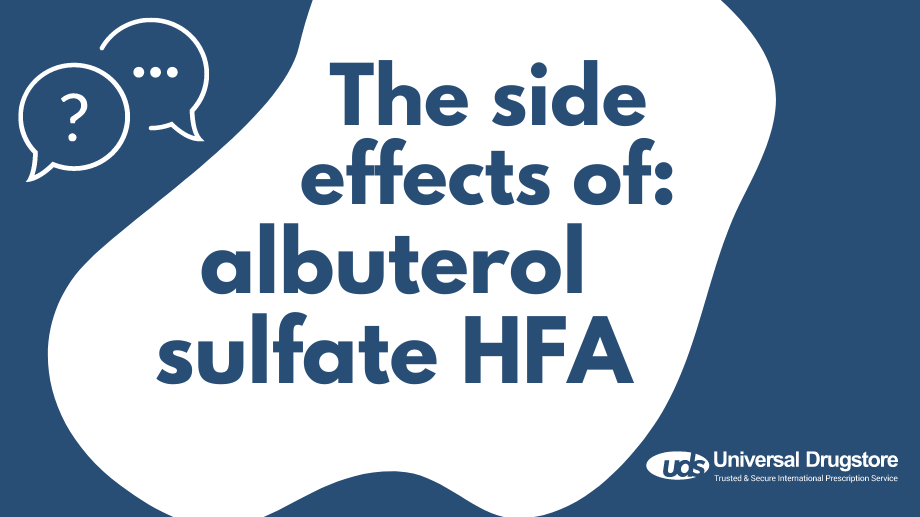Albuterol is a bronchodilator medication used to treat or prevent bronchospasm (wheezing, chest tightness, trouble breathing) in people with asthma, chronic obstructive pulmonary disease (COPD), and other lung diseases. It works by relaxing the muscles in the airways, making it easier to breathe. It is available in a variety of dosage forms, including inhalers, nebulizers, syrup, and tablets.
Albuterol HFA is a metered dose inhaler (MDI) that is considered a quick-relief or rescue inhaler. The most common side effects of this medication include headache, tremors, increased heart rate, dizziness, and sore throat. It can also rarely cause serious side effects such as paradoxical bronchospasm, which worsens your breathing and can cause more wheezing.
In this article, we will tell you about the other side effects of albuterol HFA, as well as how it works, what it is used for and its precautions.
Albuterol HFA FAQs
What is albuterol HFA?
Albuterol sulfate, also known as salbutamol, is a short-acting beta-agonist (SABA) used to prevent and treat difficulty breathing, wheezing, shortness of breath, coughing, and chest tightness caused by asthma attacks and COPD. It is also used to prevent shortness of breath and other breathing problems during exercise.
How does albuterol HFA work?
Albuterol belongs to a class of medications called bronchodilators. It works by stimulating the beta-2 receptors in the lungs, which causes the smooth muscles in your airways to relax. This relaxation allows more air to flow through your airways, making it easier to breathe.
What are some brand names of albuterol HFA?
There are several brand names of albuterol HFA available, including:
-
Proair HFA inhalation aerosol (for ages 4 years and older)
-
Proventil HFA inhalation aerosol (for ages 4 years and older)
-
Ventolin HFA inhalation aerosol (for ages 4 years and older)
Albuterol is also available in other dosage forms and brand names, including:
-
Proair Respiclick or Digihaler powder inhaler (for ages 12 years and older)
-
Albuterol syrup or tablets (for ages 2 years and older)
-
Albuterol nebulizer solution (for all ages)
-
Albuterol ER extended-release tablets (for ages 6 years and older)
How do you use your albuterol HFA inhaler?
It is important to follow the instructions for use provided by your healthcare professional or pharmacist for your albuterol HFA inhaler. Your inhaler must be primed before you use it for the first time or if your device has not been used for a while. See your specific product’s instructions on how to prime your albuterol HFA inhaler.
When using an albuterol inhaler, follow these steps:
-
Remove the cap from the inhaler and shake it well.
-
Breathe out fully, away from the inhaler.
-
Hold the inhaler with your mouthpiece down and your index finger on top of the canister. Put the mouthpiece in your mouth and close your lips around it.
-
Begin to breathe in slowly through your mouth and press down on the canister to release the medication.
-
Hold your breath for 10 seconds, or as long as is comfortable.
-
Breathe out slowly.
-
If your doctor has told you to use more than 1 spray, wait 1 minute and shake the inhaler again. Then repeat Steps 2 through 6.
-
Put the cap back on the mouthpiece after every time you use your inhaler.
If you are using a spacer with your inhaler, attach it to the mouthpiece before use. A spacer is a device that helps the medication reach your lungs more effectively.
What are the common side effects of albuterol HFA?
Like all medications, albuterol can cause side effects. According to the U.S. Food and Drug Administration (FDA), the most common adverse effects of albuterol include:
-
Rapid heart rate
-
Irregular heartbeats (palpitations)
-
Runny nose
-
Tremors or shakiness
-
Headache
-
Sore throat and hoarseness
-
Dizziness
Other side effects of albuterol may include:
-
Nervousness
-
Anxiety
-
Chest pain
-
High blood pressure
-
Insomnia (trouble sleeping)
-
Change in taste
-
Dry mouth
-
Cough
-
Vomiting
What are the serious side effects of albuterol HFA?
Rarely, albuterol HFA may cause serious side effects. If you experience any serious side effects, seek medical attention immediately, including:
-
Severe, life-threatening allergic reactions, such as rash, itching, hives, swelling of the face, lips, tongue, or throat
-
Paradoxical bronchospasm, which causes wheezing or trouble breathing that is worse after use
-
Low potassium levels (hypokalemia)
-
Worsening asthma symptoms
These are not all of the possible side effects of albuterol HFA. You should always seek medical advice from your healthcare professional for any questions or concerns about your medical condition or treatment. Read all medication guides or drug information sheets that come with this medication. You can report side effects to FDA at 1-800-FDA-1088 or www.fda.gov/medwatch.
What are some precautions with albuterol HFA?
Before using albuterol HFA, it is important to tell your healthcare provider about any medical conditions you have, including:
-
Diabetes (high blood sugar)
-
Heart problems such as heart disease, high blood pressure, or an irregular heartbeat
-
Seizures
-
Thyroid disease
-
A known allergic reaction to albuterol
-
Pregnant, plan on becoming pregnant, or are breastfeeding
It is also important to tell your healthcare provider about all the prescription drugs, herbs, over-the-counter (OTC) medications, or dietary supplements you are taking, as some may cause drug interactions with albuterol. These include beta-blockers, digoxin, diuretics, monoamine oxidase inhibitors (MAOIs), and other bronchodilators.
Related medications
Sources
-
ProAir HFA Package Insert: https://www.proair.com/globalassets/proair/hfa/proairdosecounter-prescribing-information2.pdf
-
Medscape: https://reference.medscape.com/drug/proventil-hfa-ventolin-hfa-albuterol-343426
-
GoodRx: https://www.goodrx.com/albuterol/7-albuterol-inhaler-side-effects-to-watch-out-for
-
SingleCare: https://www.singlecare.com/blog/albuterol-side-effects/









